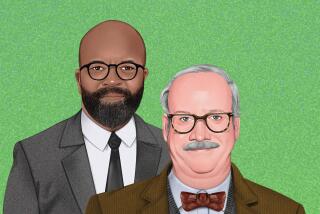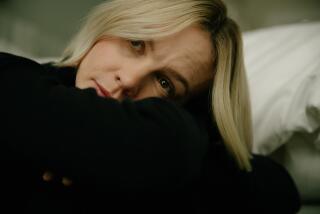Novelist Nick Hornby finds a proper job
- Share via
Although accepting compliments about his novels is something that British writer Nick Hornby just can’t get used to, he says that hearing all of the critical praise for his screenplay “An Education” has been easier than usual.
“How ever many times people tell me that they really love [a novel], inside I think, ‘Oh, God. You don’t know what’s wrong with this book,’ ” says Hornby, whose books “High Fidelity,” “About a Boy” and “Fever Pitch” have all made their way to the big screen. “But I can look at the film and think, ‘Well, I wish the screenplay was better, but [the acting] was phenomenal.’ It’s impossible not to take pleasure in that.”
Based on British journalist Lynn Barber’s autographical essay in Granta magazine about growing up in 1960s London, “An Education” debuted at the Sundance Film Festival in January and immediately put its star, Carey Mulligan, on the town’s award season radar.
“I went to Sundance, and it was really watching somebody’s life change in front of you,” Hornby says. “She’s serious about her work and the kinds of roles that she wants. I don’t think she’s going to get too sucked into it all.”
Mulligan plays a bright 16-year-old named Jenny whose clear scholarly path is somewhat disrupted when she meets a mysterious stranger, played by Peter Saarsgard. Directed by Lone Scherfig, the film, which opens Oct. 9, also has a formidable supporting cast that includes Alfred Molina, Dominic Cooper and Rosamund Pike.
Even though the film’s main character is somewhat incongruous with its screenwriter, Hornby says that giving voice to a teen girl wasn’t any more challenging than writing for other characters.
“I think the moment you’re writing about somebody who’s not exactly you, then the challenge is all equal,” he says. “I was glad that everyone around me on this movie was a woman so that they could watch me carefully. But I don’t remember anyone saying to me, ‘That isn’t how women think.’ ”
Looking at a teenager growing up in Britain on the “cusp of change” was what initially appealed to Hornby when he read Barber’s memoir.
“She’s a suburban girl who’s frightened that she’s going to get cut out of everything good that happens in the city,” Hornby says. “That, to me, is a big story in popular culture. It’s the story of pretty much every rock ‘n’ roll band.”
Hornby adds that the brevity of the original material gave him a significant amount of flexibility in adapting the screenplay.
“The original piece was probably 10 pages, and it had a structure, and it had characters,” he says. “In some ways, the very hard things were taken care of and then I had the freedom to write my own dialogue and craft my own relationships.”
Though Hornby says he would love to pen his own original screenplay (“My computer is littered with abandoned projects,” he says), he learned his lesson early on about adapting his novels after writing the screenplay for his first book, “Fever Pitch,” which was made as a British film in 1997 and remade with Jimmy Fallon and Drew Barrymore in 2005.
“The two years spent writing the book is enough for me,” Hornby says. “You spend all this time putting stuff in [the screenplay] and then someone tells you to take two-thirds of it out. It feels like the most heartbreaking job in the world.”
That being said, Hornby says that dabbling in filmmaking is a fun distraction for a normally solitary writer who’s more used to hanging around the house in a T-shirt and shorts.
“It’s like I can pretend that I’ve got a proper job,” Hornby says with a laugh. “In a way, novel writing is such a permanently student lifestyle. When it comes to movies and you have to go to these meetings and try and impress people and get money out of them, I feel as though I’m playacting at being somebody who’s grown up.”
--
More to Read
Only good movies
Get the Indie Focus newsletter, Mark Olsen's weekly guide to the world of cinema.
You may occasionally receive promotional content from the Los Angeles Times.







